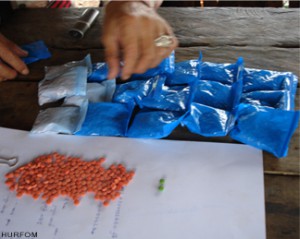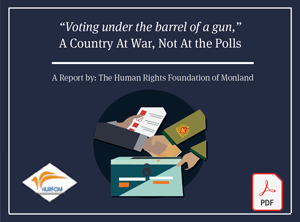Mon State communities troubled by growing Ya Ba usage among teens and students
August 20, 2012
HURFOM: The use of Ya Ba, or methamphetamine, has been steadily gaining influence with young people in Mon State. While many adults share in the market for recreational stimulants, particularly manual laborers and migrant workers seeking to endure long hours on the job, the increase among students and teenagers is causing mounting alarm as communities witness rising health and social risks for younger generations.
 Ya Ba, meaning “madness drug” in Thai, is typically manufactured as tablets containing a mixture of methamphetamine and caffeine. The drug had a surge of popularity in Thailand starting in the 1980s, but is less common there now following the government’s crackdown on drug trafficking in 2003. Today, Ya Ba still enjoys a wide consumer base throughout Southeast Asia. The pills are small, easy to transport, readily available, and highly addictive. However, the prolonged intake of methamphetamine can result in fatal kidney and lung disorders, brain or liver damage, and other mental and physical complications.
Ya Ba, meaning “madness drug” in Thai, is typically manufactured as tablets containing a mixture of methamphetamine and caffeine. The drug had a surge of popularity in Thailand starting in the 1980s, but is less common there now following the government’s crackdown on drug trafficking in 2003. Today, Ya Ba still enjoys a wide consumer base throughout Southeast Asia. The pills are small, easy to transport, readily available, and highly addictive. However, the prolonged intake of methamphetamine can result in fatal kidney and lung disorders, brain or liver damage, and other mental and physical complications.
Burma’s drug problem has received intensifying scrutiny by regional and international press agencies over the past few months. Last week, Agence France-Presse (AFP) reported that Myanmar authorities were acknowledging the country’s “deepening drug crisis,” while a Bangkok Post article described Burma as the largest producer of methamphetamine in the world, and named certain armed ethnic groups and Burmese military units as being complicit in production and trade.
A monk from Warkyi Village in Apoung Township, Mon State, said, “Young people and adults who use [Ya Ba] come mostly from areas around Moulmein, Apoung Township, and Zin Kyait Township, although it was only discovered in Zin Kyait this year.” The drug’s prevalence has also been identified along the Thai-Burmese border, including Three Pagodas Pass in Karen State.
Interviews with 30 students, monks, and community members revealed that, currently, young people are often exposed to Ya Ba between their 10th grade and university-level studies, at ages ranging from 16 to 21 years of age. According to a 20-year-old university student in Ba-an Township, Mon State, “I started hearing about the drug when I was in grade ten. I began using in my first year of university, now I am in my second. It is easy to buy drugs from other students, but harder to buy from people outside the university.”
One young man from Thanbyuzayat estimated that 80 percent of the youth and university students in his township are using Ya Ba. “Drugs are very easy to buy in some areas, although I don’t know where they come from. The local drug users have good relationships with each other and know where to buy drugs on any given day.”
In Burma, one tablet of Ya Ba typically costs around 5,000 kyat (US$5), although students reported that heightened demand during the school year may inflate the price to 6,000 or 7,000 kyat.
Young people who can only afford small amounts of Ya Ba mix the drug into a drink with opium leaves and coffee. “This drink provides a light-headed feeling, the same as opium, and is cheaper. After people use the drug, their faces look strange and they feel no fear,” explained a youth from Thanbyuzyat.
A monk from Mudon Township described how people become careless and forgetful after taking Ya Ba, and expressed concern for students who exhibit reduced interest in their studies. He said many parents send money to their children for school costs, but it may be spent on drugs instead. “Students at university, people from Ye Township, and people from Mudon Township are using Ya Ba. If our young generation cannot be productive and work for their [Mon] nation, no one will protect our literature and culture. We seem to be losing [ourselves]. I think drugs are very bad for students because they cause a lack of interest in education and are dangerous for their health. It can affect their futures.”
A student from Ba-an University explained, “In the villages, young people are using Ya Ba for their jobs. They work very hard and if they take drugs, they don’t feel tired. Some students, like me, use drugs because a friend tells them to use it, so [they] try it. When the drugged feeling leaves us, we don’t remember what we learned or memorized. Even though students know the effects of drug use, they can’t control themselves and are still using it.” He added that, previously, drug users rarely talked about their habit in public, but now it is not uncommon to hear it discussed.
It is illegal to consume, sell, or purchase recreational drugs in Burma, but community members allege that the laws go largely unenforced. A former Ya Ba user stated, “Even though the government made selling drugs illegal, they just put signs up around town, and do nothing else to administer the law.”
According to a youth from Thanbyuzayat Township, “If we want to protect people from taking the drug, it will depend on state authorities as well as local authorities. They have to join together because some local police do not arrest drug traffickers. People who give money to the [local] police can do whatever they want, like selling drugs or [operating] gambling centers. State authorities sometimes order [the police] to arrest drug users, but they just arrest one or two to prove [their compliance] to state officials, and then take bribes and release the detainees.”
A university student from Mudon Township said, “There are so many kinds of drugs [available], such as Ya Ba, opium, and marijuana. The police ignore people using Ya Ba and focus on opium users instead. If they catch someone using Ya Ba, they will just take a bribe and let the person go.”
Some village-level authorities are also suspected of reacting slowly to criminalize drugs due to financial gain or conflicting interests. A resident of BaLuKyine Township stated that her village leaders do not apprehend dealers because they are being furnished with a cut of the drug proceeds. “This is the biggest problem among the youth, and I want the New Mon State Party (NMSP) to come and solve it. Of course, if they arrest the drug dealers, the result would hit them in the rice pot because they benefit from drug trafficking.”
According to a monk from MawKaNin village in Ye Township, “Before, when boys reached their teen years, they wanted to drink alcohol. Now, they try drugs first.”
Authorities reject large-scale protest of Kaw Taung District power plant
August 14, 2012
HURFOM: On August 7, 2012, U Than Htun, the regional organizer of the Democratic Party (Myanmar), and other local residents of Kaw Taung District were denied their application to the Tenasserim Region Government Chief Minister to permit 100,000 people to protest the nearby Than Phyo Thu coal-fired power plant. U Than Htun’s group applied to have 30 government security personnel safeguard the protestors, but the request was refused because township authorities perceived the number to be too low for such a large protest, and asserted that the march would interrupt the area’s regular activities. Read more
Armed ethnic groups sign Deed of Commitment to highlight dedication to children in armed conflict
August 7, 2012
HURFOM: On August 2nd, two armed ethnic resistance groups, the New Mon State Party (NMSP) and the Karenni National Progressive Party (KNPP), signed Geneva Call’s Deed of Commitment (DoC) to pledge their dedication to the protection of children in armed conflict. The signatures also certify that the two parties agree to monitoring inspections and cooperation with independent regional and international organizations to verify compliance in their territories. Read more
Migrant voices: Illegal abortion among women from Burma working in Thailand
August 7, 2012
WCRP: One month ago, Thai Labor Minister Padermchai Sasomsap proposed a plan to send pregnant migrant workers in Thailand back to their home countries to give birth[i]. The Minister introduced the initiative as an effort to curb child trafficking, but migrant and human rights organizations quickly came out in opposition to what they consider to be dangerous discrimination. In addition, the news touched on the long-standing issue of illegal abortions in Thailand, which, while not completely understood, are alleged to be prevalent among the migrant community. In Mahachai, Thailand, a booming industrial city with hundreds of factories and an estimated 400,000 Burmese migrants, the staff members at local medical clinics describe the frequency, motives, and dangers behind the hidden trade in illegal abortions. Read more




















































